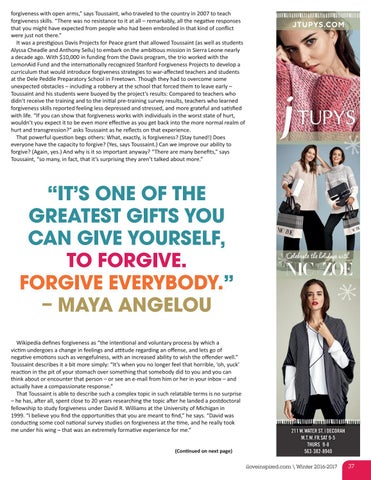forgiveness with open arms,” says Toussaint, who traveled to the country in 2007 to teach forgiveness skills. “There was no resistance to it at all – remarkably, all the negative responses that you might have expected from people who had been embroiled in that kind of conflict were just not there.” It was a prestigious Davis Projects for Peace grant that allowed Toussaint (as well as students Alyssa Cheadle and Anthony Sellu) to embark on the ambitious mission in Sierra Leone nearly a decade ago. With $10,000 in funding from the Davis program, the trio worked with the LemonAid Fund and the internationally recognized Stanford Forgiveness Projects to develop a curriculum that would introduce forgiveness strategies to war-affected teachers and students at the Dele Peddle Preparatory School in Freetown. Though they had to overcome some unexpected obstacles – including a robbery at the school that forced them to leave early – Toussaint and his students were buoyed by the project’s results: Compared to teachers who didn’t receive the training and to the initial pre-training survey results, teachers who learned forgiveness skills reported feeling less depressed and stressed, and more grateful and satisfied with life. “If you can show that forgiveness works with individuals in the worst state of hurt, wouldn’t you expect it to be even more effective as you get back into the more normal realm of hurt and transgression?” asks Toussaint as he reflects on that experience. That powerful question begs others: What, exactly, is forgiveness? (Stay tuned!) Does everyone have the capacity to forgive? (Yes, says Toussaint.) Can we improve our ability to forgive? (Again, yes.) And why is it so important anyway? “There are many benefits,” says Toussaint, “so many, in fact, that it’s surprising they aren’t talked about more.”
“IT’S ONE OF THE GREATEST GIFTS YOU CAN GIVE YOURSELF, TO FORGIVE. FORGIVE EVERYBODY.” – MAYA ANGELOU Wikipedia defines forgiveness as “the intentional and voluntary process by which a victim undergoes a change in feelings and attitude regarding an offense, and lets go of negative emotions such as vengefulness, with an increased ability to wish the offender well.” Toussaint describes it a bit more simply: “It’s when you no longer feel that horrible, ‘oh, yuck’ reaction in the pit of your stomach over something that somebody did to you and you can think about or encounter that person – or see an e-mail from him or her in your inbox – and actually have a compassionate response.” That Toussaint is able to describe such a complex topic in such relatable terms is no surprise – he has, after all, spent close to 20 years researching the topic after he landed a postdoctoral fellowship to study forgiveness under David R. Williams at the University of Michigan in 1999. “I believe you find the opportunities that you are meant to find,” he says. “David was conducting some cool national survey studies on forgiveness at the time, and he really took me under his wing – that was an extremely formative experience for me.” (Continued on next page) iloveinspired.com \ Winter 2016-2017
37
